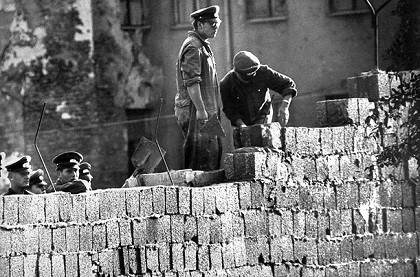18 May 2018
This question has been integral to my time as a teacher, both in the classroom and as a school leader. I have asked the question of almost every class that I have taught, because a significant aspect of history relates to the nature of change, whether revolution or reform. The British Empire, the French, Russian and American Revolutions. They all involve deconstruction; old system being dismantled and broken down. Taking things apart is great fun as the images above suggest; putting them back together is a more worrying proposition; it is easy to identify what doesn’t work, but not what might make things work more effectively. Many revolutions take wrong turns into extremism because destruction is easier than modification or reconstruction.
Deconstruction can be cathartic and of huge symbolic importance. The Berlin Wall was shoddily built in August 1961 and gleefully knocked down in 1989. Some things should be destroyed. The destruction of Palmyra and the damage done to the Bamiyan Buddas were acts of ideological vandalism; iconoclasm at its worst.
If taking things apart was confined purely to the history classroom, than life would be much more straightforward. As a school leader I have gone through three significant changes to the exam system. Some of which was clearly necessary, others aspects based upon political expedience or the ideological conviction of different Secretaries for Education.
We have recently been making a number of appointments and, as part of the associated lesson observations, I have spent time with a retiring colleague who has led one of our departments very successfully for a number of years. He is a model of calm professionalism and we were discussing the future of the department and he expressed his wariness of ‘reckless optimism’ and the compulsion to change things too quickly without a clear understanding of the possible consequences. As a 16 year old he had joined the Merchant Navy and had been sent to sea. He was given a small cabin below deck and began to unpack. Being a fastidious type, he noticed that the wall of his cabin had a large number of screws, nails and beer mats randomly affixed. He removed each in turn so that the wall looked presentable. That night he was beset by creaks, groans and grating noises as the cabin walls moved. He spent the rest of the week trying to put all of the items that he had removed back into the correct places. Don’t take things apart unless you know how to put them back together. The sailors that he was replacing had known what they were doing; they had done things for a reason. Change what is necessary, keep what works. His story reminded me of the constant mantra of another experienced colleague. Every time we discussed a possible change he would comment, ‘Is it sustainable?’ If you do it now, will it still be possible to do it in a week? A month. A year? If not, take care. Recent governments have been keen to undo and take apart, we will see in the summer if their new system is an improvement. If it is sustainable. Has it been put back together effectively?
Mr O’Sullivan
